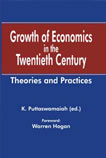Growth of Economics in the Twentieth Century
Theories & Practices
K. Puttaswamaiah (ed.)
978-0-9823895-2-2 / July 2009 / 687 pages, US $ 79.50
Buy Now

The array of contributions offered in this volume on the growth of economics is comprehensive. There are sufficient number of ideas and perspectives about economic themes to whet the appetite of the most scholarly of readers. Others, more inclined to welcome efforts to explain economic phenomena, will find a diversity of interpretations of events which should be sufficient to stimulate the imagination as well as the understanding of policy choices.
The book offers insights about developments in economic theory and modes of analysis during the twentieth century and earlier.
Rarely in one place has such an eminent group of prolific scholars explored the twists and turns of the development of the discipline known as the ‘Queen of the social sciences’.
—John Lodewijks, Professor & Head, Univ. of Western Sydney
All the scholars have to save this book near the writing-desk.”
—Vittorangelo Orati, Professor & Rector, Iiaess
Contents
The Development of Nineteenth-century British Monetary Orthodoxy:
Neil.T.Skaggs; Mechanical Analogies in Adam Smith:
James E. Alvey; Early Response to Adam Smith:
Hiroshi Mizuta; The Instrumental Political Economy of Adolph Lowe:
James Ronald Stanfield & Michael C. Carroll; Some Unpublished Correspondence of William Thomas Thornton, 1866-1872:
Mark Donoghue; Natural Laws in Economics: Quesnay his Predecessors and Contemporaries:
Gilles Dostaler; The Formation of Maltus’s First Essay:
Yoshio Nagai; Crises in Marx’s Analysis of the Market:
M.C. Howard and J.E. King; Marshall and the Development of Neoclassical Economics:
Neil Hart; Marshallian Demand Function and the Adjustment of Competitive Markets:
Jesus M. Zaratiegui; Wicksell’s Cumulative Process: A Vindication to Modern Eyes:
William Coleman; What Does Profit Mean for Alfred Marshall?:
Jesus M. Zaratiegui; Further Applications of J.M. Keynes Approach to Decision–Making Under Risk and Uncertainty:
Michael Emmett Brady; Applications of Option–Pricing Theory: Twenty – Five Years Later:
Robert C. Merton; Manager Versus Entrepreneur in Alfred Marshall’s Economics:
Jesus M. Zaratiegui; The Invisible Mr. Keynes-Empirical Versus Theoretical Arguments:
Craig Freedman; J.M. Keynes’s Decision Theory and Preference Reversals:
Michael Emmett Brady; A Mathematical Proof of Keynes’ General Case:
Michael Emmett Brady; The History of Economics thought of the Last 200 Years through its Schools and its Canons:
O.F. Hamouda; The General Equilibrium Theory in The 20th Century Japan:
Takashi Negishi; History of Economics the Origin of Economic Thoughts in Ecology and Molecular Biology:
Lillemor Lewan; Recent Developments in The History of Economics:
John Lodewijks; The Chicago Counter-Revolution and The Sociology of Economic Knowledge:
Robert Leeson; Economic Management and The Keynesian Revolution: The Policy Consequences of The Disappearance of Say’s Law:
Steven Kates; The Contemporary Relevance of The ‘Critical Economic Systems Approach’ to Political Economy in The Tradition of Marx, Veblen, Keynes and Schumpeter:
Philip Anthony O’Hara; Some Observations on Engaging in “Survival Research”:
John H. Herz; Class and Monopoly:
Stephen Resnick and Richard Wolff; Another Look at The Inflation- Productivity Trade-Off:
George C. Bitros and Epaminondas J. Panas; The Revival of The Comparative Costs, The Space and The Proximity in Year 2000:
Gaston Gaudard; Paul Samulson-The Theorist as Historian of Economic Thought:
D.P. O’Brien; Ronald Coase as A Dissenting Economist:
Steven G. Medema; A Synopsis of Lawrence R. Klein’s Thoughts and Contributors to Economics:
Anastassios D. Karayiannis; The Galbraithian Contribution to Political Economy:
James Ronald Stanfield; Reflections on Colin Simkin:
Warren P.Hogan; Reflections on My Century:
John Herz

 The array of contributions offered in this volume on the growth of economics is comprehensive. There are sufficient number of ideas and perspectives about economic themes to whet the appetite of the most scholarly of readers. Others, more inclined to welcome efforts to explain economic phenomena, will find a diversity of interpretations of events which should be sufficient to stimulate the imagination as well as the understanding of policy choices.
The array of contributions offered in this volume on the growth of economics is comprehensive. There are sufficient number of ideas and perspectives about economic themes to whet the appetite of the most scholarly of readers. Others, more inclined to welcome efforts to explain economic phenomena, will find a diversity of interpretations of events which should be sufficient to stimulate the imagination as well as the understanding of policy choices.